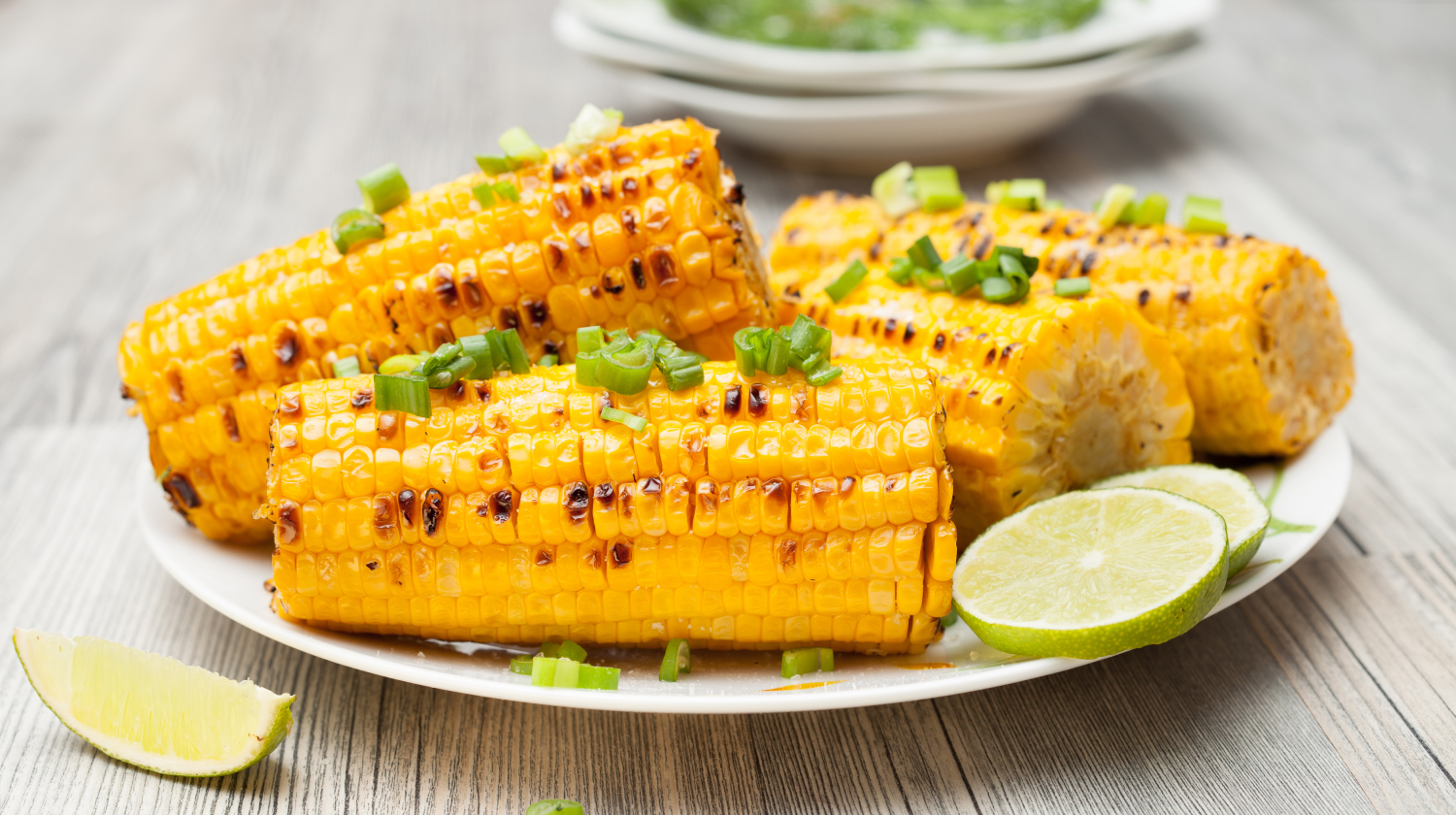Is Corn Paleo? Here’s What You Need To Know 2024

When you begin any new diet, it can be hard to know what you can and can’t eat,, and the reasons behind those rules. Going paleo is no exception and has quite a restrictive food list. Many things seem off-limits, including grains and dairy, which can confuse newcomers who want to follow the diet correctly.
One food that commonly confuses is corn. Is corn paleo? The short answer is no, but let’s look at what this diet entails and why corn does not fit.
Can You Eat Corn On Paleo?
No, you cannot eat corn on the paleo diet. All forms of cereal grains and pseudo-grains are not allowed on the diet, and corn is included in this category.
Corn Nutrition Facts
Corn, also known as maize, is a popular cereal grain with various nutritional benefits. Here are some essential nutrition facts[1] for one cup (145 grams) of raw, yellow sweet corn:
- Calories: 125 kilocalories
- Total Fat: 1.96 grams
- Cholesterol: 0 milligrams
- Sodium: 21.8 milligrams
- Potassium: 392 milligrams
- Total Carbohydrate: 27.1 grams
- Dietary Fiber: 2.9 grams
- Sugars: 9.08 grams
- Protein: 4.74 grams
It’s important to note that these values may vary slightly depending on the type and preparation of corn. No matter the nutritional value, no type of corn is allowed on the paleo diet. And yes, that includes popcorn, corn flour, and corn meal!
Why We Can’t Have Corn On The Paleo Diet
After reading about corn’s nutrition facts, you may wonder why corn is bad for you? Overall, it isn’t. However, the paleo diet is based on consuming foods our ancestors might have eaten during the Paleolithic era.
This diet primarily includes lean meats, fish, fruits, vegetables, nuts, and seeds while excluding grains, legumes, dairy products, refined sugars, and processed foods.
Corn, while not a gluten-containing grain, is still considered a cereal grain that is not paleo-friendly for several reasons:
- Agriculture Timeline: The cultivation of corn started around ten thousand years ago, which is after the Paleolithic era.[2]
- Digestibility: Grains, including corn, contain certain compounds such as lectins, phytic acid,[3] and gluten that can be difficult to digest for some individuals. These compounds may cause inflammation and gut irritation, interfering with nutrient absorption.
- High carbohydrate content: The paleo diet promotes a lower carbohydrate intake,[4] focusing on healthy fats and proteins as primary energy sources. Corn is relatively high in carbohydrates, which can reduce the macronutrient breakdown often recommended on a paleo diet. As a side effect, weight loss usually occurs on this diet.
- Genetic modification: A significant portion of corn produced today is genetically modified to improve crop yield and resistance to pests. The paleo diet encourages consuming whole, unprocessed foods, which doesn’t align with food such as genetically modified corn.
Alternative Choices For The Paleo Diet
Several alternatives to corn can be included in the paleo diet that contains a similar nutritional profile. Some of these paleo-friendly substitutes include:
Vegetable, Nut And Seed Alternatives
- Cauliflower: Cauliflower rice is a popular low-carb alternative to corn and other grains. You can pulse raw cauliflower florets in a food processor until they reach a rice-like consistency and then cook them as desired.
- Zucchini: Zucchini doesn’t provide the same level of sweetness as corn, but it can add a similar satisfying bite to salads. You can also spiralize zucchini into noodles and use it as an alternative to pasta.
- Spaghetti squash: Spaghetti squash has a noodle-like texture when cooked. This can be used as a grain-free alternative to corn or corn-based gluten-free pasta in various dishes.
- Sweet potatoes: Roasted or mashed sweet potatoes can provide a similar starchy texture and sweetness as corn, making them a suitable paleo-friendly alternative.
- Butternut squash: With its slightly sweet taste and firm texture, butternut squash can be diced and roasted or pureed. It is a suitable alternative to corn in soups, stews, and side dishes.
- Nuts and seeds: Nuts and seeds such as almonds, walnuts, pumpkin seeds, or sunflower seeds can also be added instead of corn. They can be added to salads and other dishes for added crunch and flavor.
Grain And Flour Alternatives
- Almond flour: Made from ground almonds, almond flour is a versatile, low-carb, and gluten-free alternative to wheat flour. It can be used in baking, breading, or to thicken sauces.
- Coconut flour: Coconut flour is another grain-free option used in baking and cooking. It’s high in fiber and has a slightly sweet taste, making it suitable for both savory and sweet dishes.
- Chia seeds: Chia seeds can be used as a grain substitute in recipes like porridge, puddings, or smoothies. They are an excellent source of omega-3 fatty acids, fiber, and other essential nutrients.
Other Foods To Avoid On The Paleo Diet
The paleo diet excludes certain food groups that emerged with the advent of agriculture and modern food processing techniques. Here are the main foods to avoid on the paleo diet and what to watch out for when you read food labels:
- Grains: This includes wheat, rice, barley, oats, corn, and other cereal grains. Paleo dieters argue that our bodies have not fully adapted to digesting grains, which can lead to inflammation, digestive issues, and an imbalance in blood sugar levels.
- Legumes: Beans such as lima beans, lentils, peas, peanuts, and soy products are excluded from this diet. Some of these plant foods contain antinutrients[5] like lectins and phytic acid, which may interfere with nutrient absorption and cause gastrointestinal issues in some individuals.
- Dairy: Milk, cheese, yogurt, and other dairy products are generally avoided on the paleo diet. The primary concern is that many people are lactose intolerant, and consuming dairy can lead to impaired gut health and a leaky gut. However, other evidence suggests eliminating dairy may cause its own set of health issues.[6]
- Refined sugars and artificial sweeteners: Adding table sugar, or eating foods with a high fructose corn syrup level, and consuming sweeteners can cause spikes in blood sugar levels and increase insulin resistance.[7] This can contribute to weight gain, inflammation, and other health issues. The diet encourages moderation consumption of natural sweeteners like honey, maple syrup, or fruit.
- Processed and refined oils: Vegetable oils, such as canola, soybean, and corn oil, are highly processed and high in omega-6 fatty acids, which are associated with inflammation[8] when consumed in excess. Instead, the diet recommends healthier fats like olive, coconut, and avocado for a healthy immune system and overall well-being.
- Alcohol, soda, and sugary drinks: Most alcoholic beverages are made from grains or contain added sugars, making them unsuitable for the paleo diet. Sodas are also high in added sugars and artificial ingredients, which can lead to weight gain and other health concerns.
By avoiding these foods and increasing foods high in vitamins and minerals, the paleo diet aims to promote better digestion, healthy skin, reduced inflammation, stable blood sugar levels, and a strong immune system.
Conclusion
If you are following the paleo diet, it is time to say goodbye to anything containing corn and switch it out with paleo-approved whole foods.
When following any kind of new diet, it can take some time to get used to it before you are in the swing of things. Following a specific diet is best done under the supervision of a healthcare professional, who may even suggest paleo supplements or a meal plan, particularly while you transition to cover any gaps in nutrition.
+ 8 sources
Health Canal avoids using tertiary references. We have strict sourcing guidelines and rely on peer-reviewed studies, academic researches from medical associations and institutions. To ensure the accuracy of articles in Health Canal, you can read more about the editorial process here
- Usda.gov. (2023). FoodData Central. [online] Available at: https://fdc.nal.usda.gov/fdc-app.html#/food-details/169998/nutrients
- Patel, S. and Hafiz (2017). Ethnic and paleolithic diet: Where do they stand in inflammation alleviation? A discussion. [online] 4(4), pp.236–241. doi:https://doi.org/10.1016/j.jef.2017.10.004.
- Brouns, F. (2021). Phytic Acid and Whole Grains for Health Controversy. [online] 14(1), pp.25–25. doi:https://doi.org/10.3390/nu14010025.
- Bożena Frączek, Pięta, A., Burda, A., Mazur-Kurach, P. and Florentyna Tyrała (2021). Paleolithic Diet—Effect on the Health Status and Performance of Athletes? [online] 13(3), pp.1019–1019. doi:https://doi.org/10.3390/nu13031019.
- Mrinal Samtiya, Aluko, R.E. and Tejpal Dhewa (2020). Plant food anti-nutritional factors and their reduction strategies: an overview. [online] 2(1). doi:https://doi.org/10.1186/s43014-020-0020-5.
- Manheimer, E., E.J. van Zuuren, Fedorowicz, Z. and Hanno Pijl (2015). Paleolithic nutrition for metabolic syndrome: systematic review and meta-analysis. [online] 102(4), pp.922–932. doi:https://doi.org/10.3945/ajcn.115.113613.
- Mathur, K., Agrawal, R., Shailesh Nagpure and Deshpande, D. (2020). Effect of artificial sweeteners on insulin resistance among type-2 diabetes mellitus patients. [online] 9(1), pp.69–69. doi:https://doi.org/10.4103/jfmpc.jfmpc_329_19.
- DiNicolantonio, J.J. and O’Keefe, J.H. (2018). Omega-6 vegetable oils as a driver of coronary heart disease: the oxidized linoleic acid hypothesis. [online] 5(2), pp.e000898–e000898. doi:https://doi.org/10.1136/openhrt-2018-000898.



